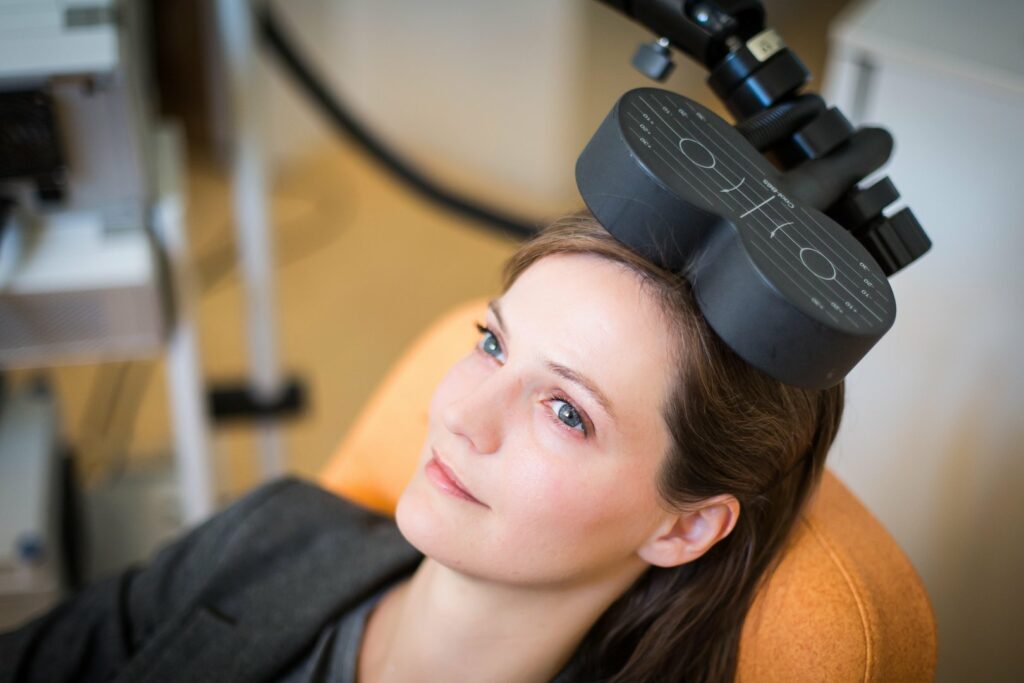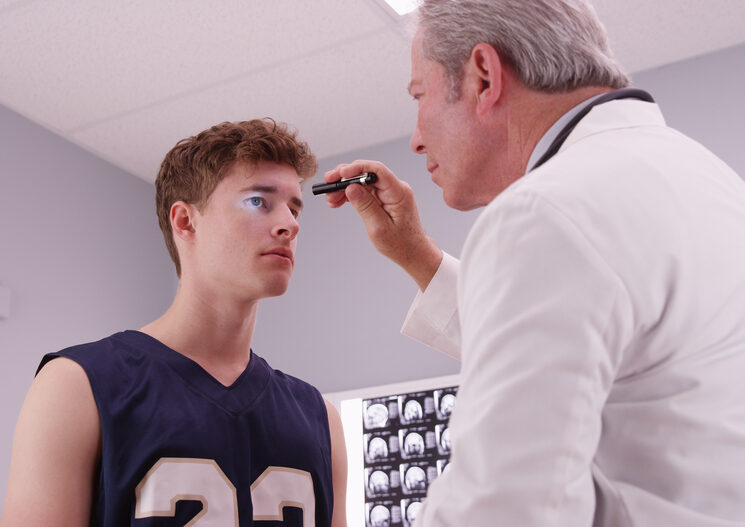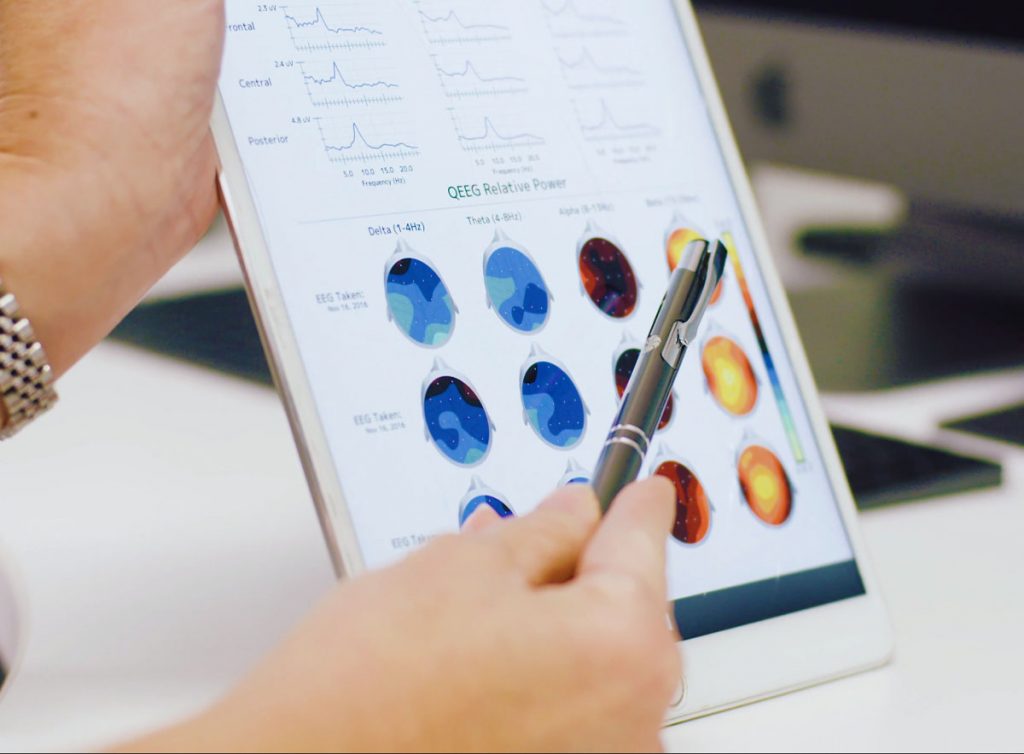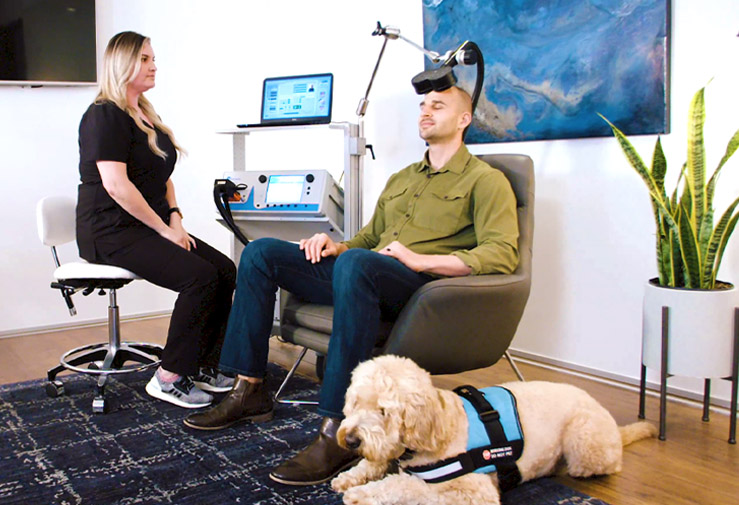Get Your Life Back
After a Traumatic Brain Injury
MeRT (Magnetic e-Resonance Therapy) is a breakthrough treatment for TBI symptoms.
This non-invasive, drug-free protocol uses magnetic waves to gently stimulate precisely targeted areas of the brain. This highly tailored treatment plan can result in significant system improvement.
Breakthrough TBI Treatment
A Traumatic Brain Injury can affect every aspect of daily life. And it’s not just the physical symptoms like headaches, dizziness, or nausea. TBIs can also cause mental, emotional, and cognitive issues such as mood swings, memory problems, depression, and so much more.
These symptoms typically resolve over time if it’s a mild concussion. But sometimes the symptoms are more severe and don’t improve, despite treatments and medications—and the longer you have them, the worse it can get.
That’s when life often becomes unbearable. And that’s when you need a different solution.
Here at the Brian Treatment Center of Atlanta, we are proud to offer that solution: MeRT, or Magnetic e-Resonance Therapy. And it’s helped thousands overcome the painful, debilitating symptoms of Traumatic Brain Injury.*
* Results are based on active and strict observation of our regimens. Results may vary based on the individual user and are not guaranteed.

Call our New Patient Coordinator
Or fill in the Contact Form Below

The EEG, or brain map, is key to the success of the MeRT treatment. By mapping the brain, we can clearly see any imbalance in brainwave activity. Then, through a highly personalized treatment plan using TMS, we can strengthen the connections in the brain.
The equipment used is FDA-cleared to treat Major Depressive Disorder and OCD and is used off-label to treat a wide variety of conditions, including TBI.
* Results are based on active and strict observation of our regimens. Results may vary based on the individual user and are not guaranteed.
MeRT Treatment for TBI and Concussion: How It Works
MeRT (Magnetic e-Resonance Therapy) is highly effective in treating symptoms of Concussion and Traumatic Brain Injury. This non-invasive, drug-free treatment combines:
1. Quantitative Electroencephalogram (qEEG),
2. Electrocardiogram (ECG/EKG), and
3. Transcranial Magnetic Stimulation (TMS, an FDA cleared therapy).
Standard TMS treatments are a “one size fits all” approach. MeRT improves upon this as it’s highly individualized as to both frequency and location. As a result, this treatment can significantly reduce symptoms.*


What is Traumatic Brain Injury?
The CDC (Centers for Disease Control and Prevention) defines TBI as “an injury that affects how the brain works.” TBIs can range from severe (gunshot) to mild (blow to the head or body).
A concussion is a mild TBI, which the Mayo Clinic defines as “a traumatic brain injury that affects your brain function. Effects are usually temporary but can include headaches and problems with concentration, memory, balance, and coordination.” However, while a TBI may be medically referred to as “mild” since it’s not life-threatening, the results can be anything but.
When you receive a TBI, your brain can bounce around or twist in the skull. This can also cause chemical changes in your brain or brain cell damage. And depending on how severe the injury is, a TBI can cause health problems that last from a few days to the rest of your life.
Traumatic Brain Injury Symptoms
Some of the more common TBI symptoms include:
- Loss of consciousness
- Headaches
- Fatigue or lethargy
- Dilated pupils and vision changes
- Dizziness
- Memory problems
- Confusion
- Cognitive decline
- Inappropriate emotional responses
- Anger
- Depression
- Feeling of isolation
- PTSD (post-traumatic stress disorder)
- Anxiety or panic attacks
- Facial weakness
- Weakness or loss of function in other parts of the body
- Loss of bladder or bowel control
- Breathing problems
- Numbness and tingling in different parts of the body
- Loss of hearing or tinnitus
If left untreated, a Traumatic Brain Injury can lead to a shortened life span and significant complications.

Call our New Patient Coordinator
Or fill in the Contact Form Below
“This treatment changed everything.”
I’m back! My TBI turned me into someone I barely recognized. I was depressed, mean, and short-tempered. I pushed through life filled with frustration and a deep sense of sadness that this was it. I’m so glad I was wrong. I think my direct reports and family are even more thankful. This treatment changed everything, and I am forever thankful.”
– 41-year-old executive with TBI, after MeRT treatment at Brain Treatment Center
The Steps of MeRT Treatment for Traumatic Brain Injury
Your first step to determine if MeRT is the right treatment for you is a call to our New Patient Coordinator. She can answer any questions you have about the treatment, protocols, cost, and payment options. Then, once you decide to move forward, we will set up your first two appointments, for testing and consultation. Each of these appointments will last 45 minutes to an hour. After this, you will have a two-week assessment period where the actual procedure and monitoring take place.

1. Testing
On your first appointment, we perform the qEEG and ECG/EKG. These tests are simple and painless and done right in our office. For the EEG, we place a cap on your head to measure the electrical activity in your brain and map out any areas not performing as they should. Additionally, in the EKG, we attach a simple electrode to your chest to record the heart’s electrical signals and measure the brain/heart coherence.
Once we complete the tests, our team will carefully analyze the results. Based on this analysis, we develop a treatment plan customized to your specific condition and schedule your assessment period of treatment.

2. Consultation
Your second appointment, after your qEEG/EKG, is a one-on-one consultation. You can do this either in person or virtually from the comfort of your home. We will discuss your test results and treatment protocols, answer any questions you may have, and let you know more about what to expect during your assessment period of treatment. Should you choose to go ahead with the assessment period, the cost of the qEEG and consultation will go toward the assessment period pricing.

3. Assessment Period
In the two-week assessment period, we will perform a short course of treatment followed by a new EEG to see how you are responding. The first week of treatment will last for five days, Monday through Friday. The second week of treatment will last for four days, Monday through Thursday, followed by new testing on Friday.
We determine progress based on the new EEG results compared to the initial one done and symptom improvements.
If there is a positive response to treatment during the assessment period, you will have likely noticed some improvements starting to take place. At that point, we will schedule additional MeRT treatment in two-week intervals.
At the end of every two weeks, we will perform a qEEG/EKG to monitor your progress, and you will then have a consultation to confirm that changes are still showing on the testing. Most conditions treated with MeRT provide noticeable and long-lasting results after six weeks of treatment. However, each patient is different, and your results may vary.

Call our New Patient Coordinator
Or fill in the Contact Form Below
Questions About MeRT? Contact Our New Patient Coordinator
We understand that you may be going through a lot of difficulty with your TBI symptoms. We also know that you may have many questions about whether MeRT is the right treatment.
This is not a light decision, and we want to make it as easy as possible for you to get the information you need. Our New Patient Coordinator is here to do just that.
She’ll answer all your questions, listen to your concerns, explain costs, and put your mind at ease. She can also assist you in getting scheduled should you decide to move forward with treatment.
Insurance Coverage and Payment Options

For all insurance, we are considered out of network and are unable to file insurance on your behalf. We can, however, provide you with the appropriate paperwork at the end of your treatment, which you can then submit to your insurance company for potential reimbursement.
Currently, rTMS is FDA-cleared for some types of Depression. Some patients have reported that they have been able to receive some reimbursement for EEGs or clinical evaluations, but this depends on their health coverage. Medicare patients have reported that their coverage provides no reimbursement for MeRT.
Credit Options
We take all major credit cards including Visa, MasterCard, American Express, and Discover. You may also want to look into Care Credit as an option. Care Credit is a credit card that can be used to cover medical expenses and services, and they typically offer zero-interest financing for 12 months. When you apply at the Care Credit website, they will usually let you know promptly if approval has been granted.
Contact Us
For more information or to speak with our New Patient Coordinator, please fill in the information below.